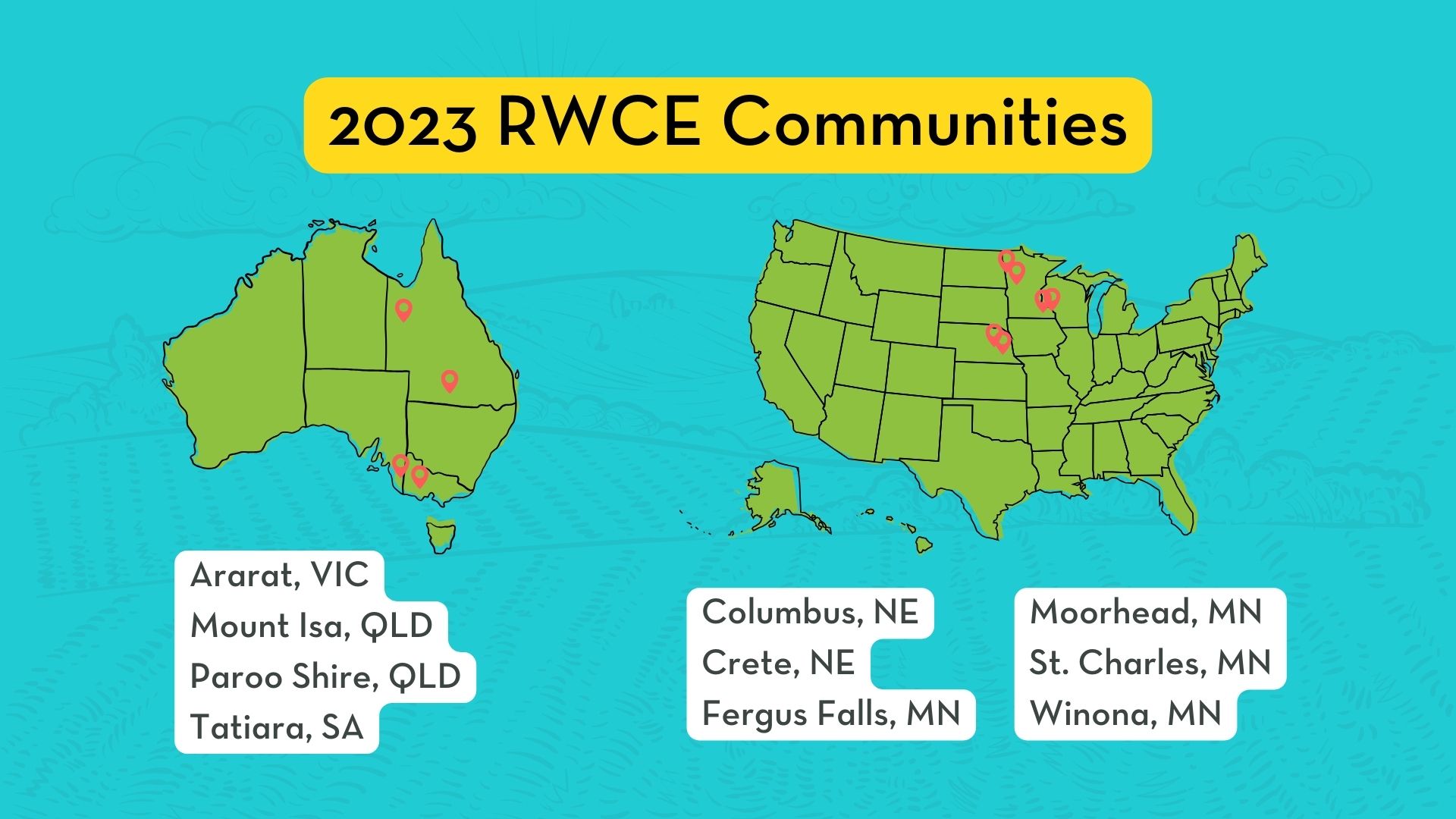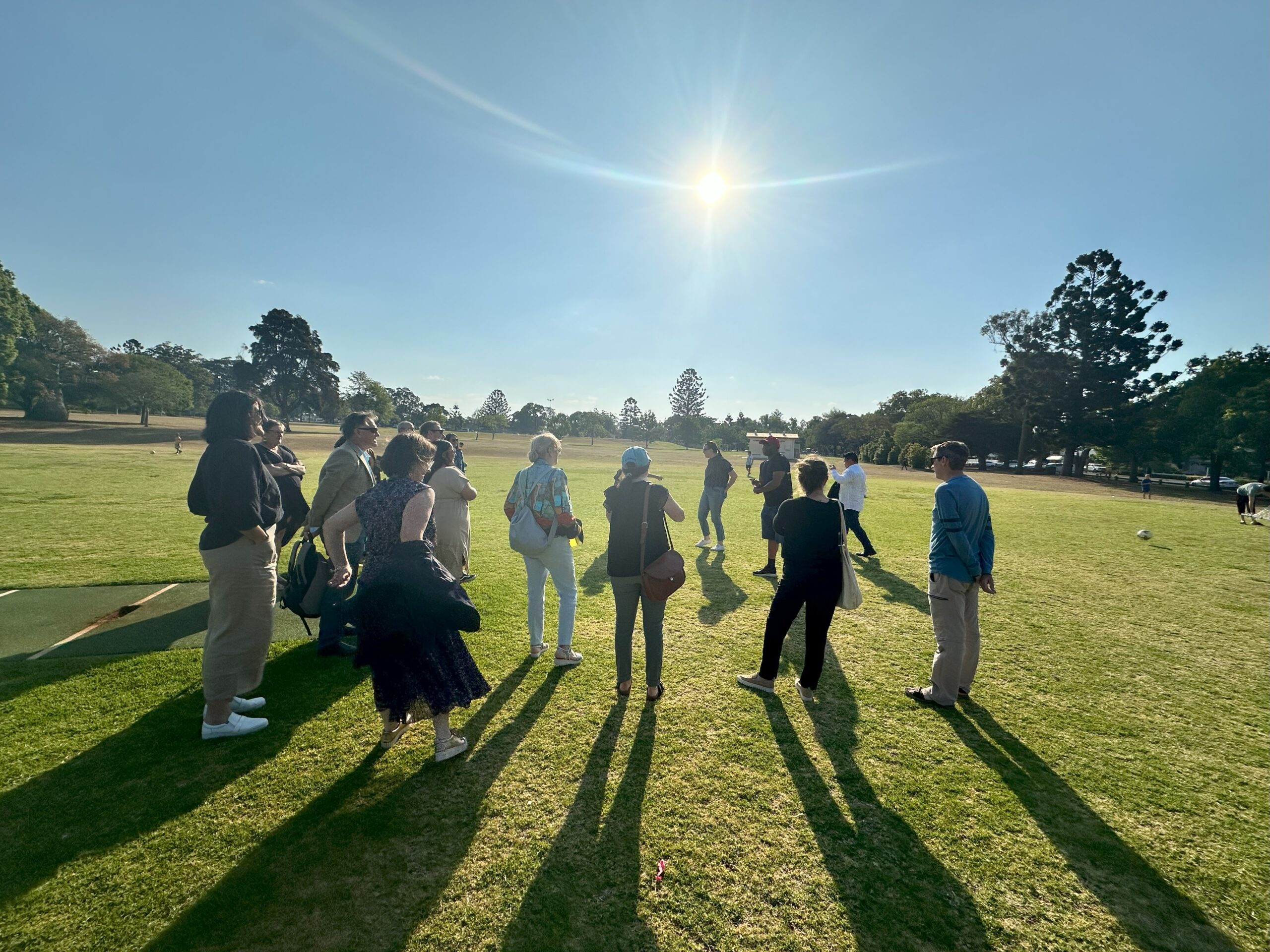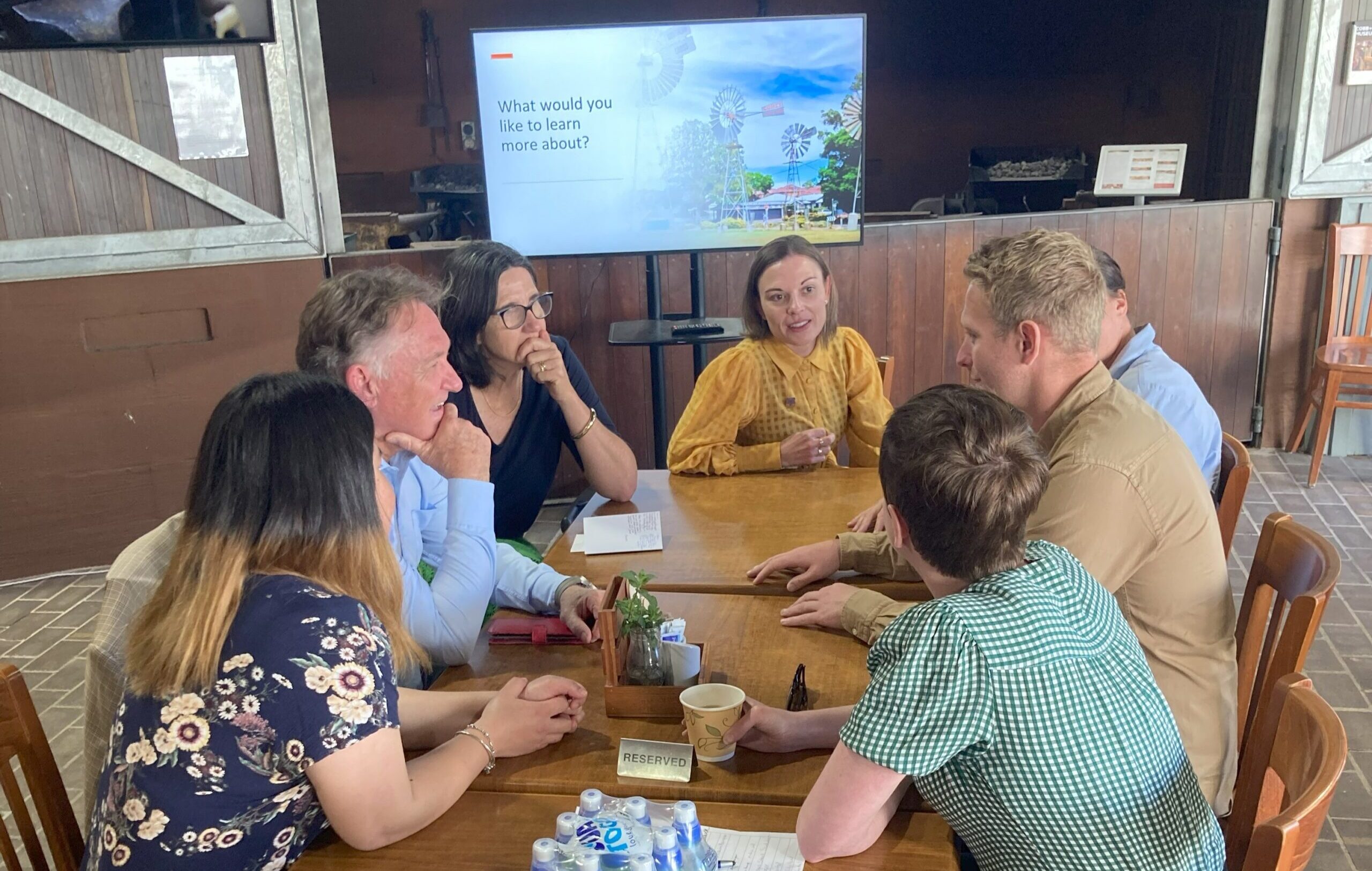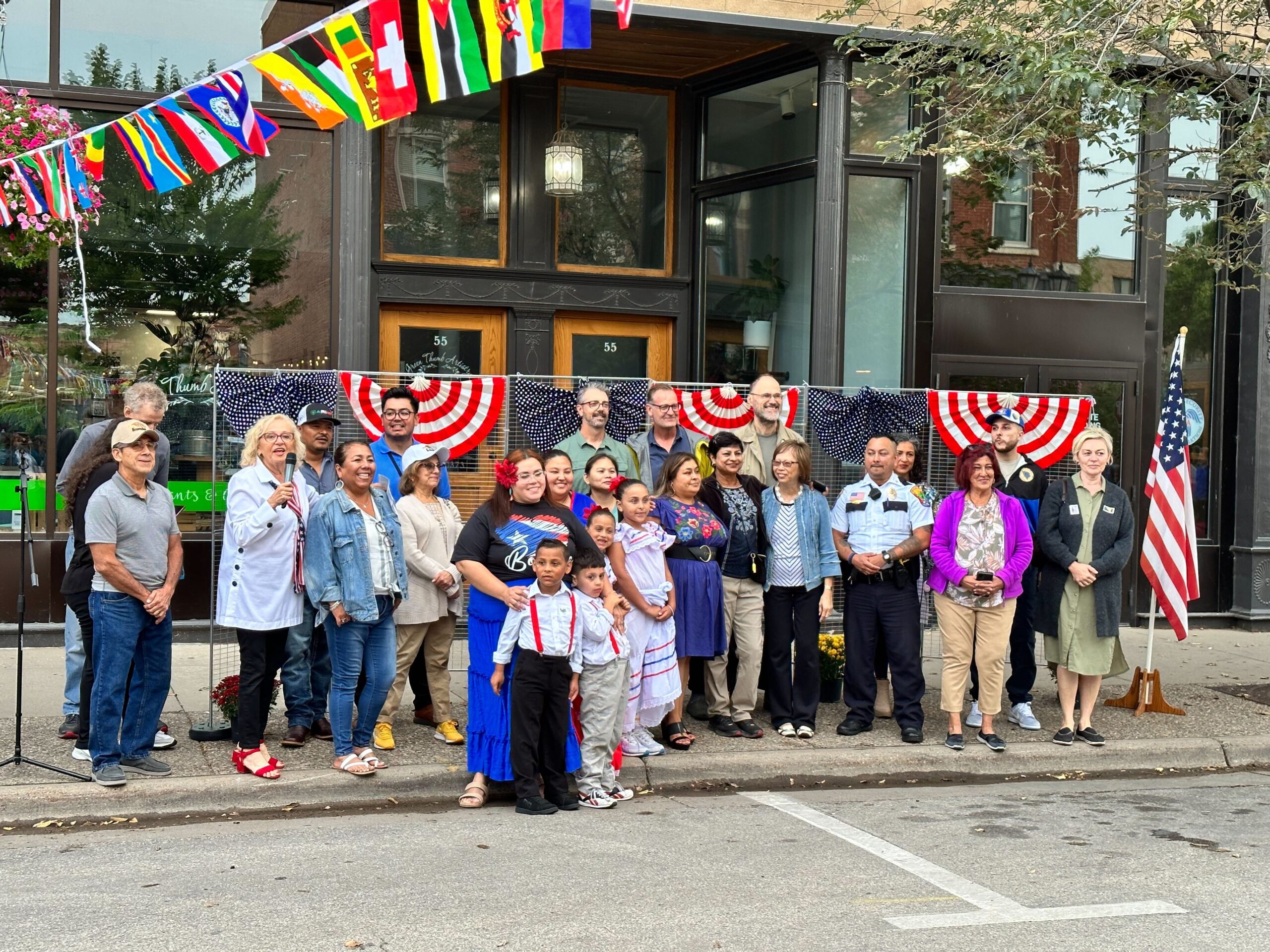
Around the world, immigrants and refugees come to different countries searching for education, employment, safety, and ultimately, to be part of a thriving community.
Many newcomers follow the steady employment, reasonable cost of living, and opportunities for social cohesion that can be found in smaller cities and rural areas. As a result, some of the most rapidly diversifying places around the world are rural. In return, rural areas often thrive because newcomers help revitalize and add vibrancy to these communities.
Equipping rural leaders with the knowledge and skills to welcome newcomers has numerous benefits, from sparking new ideas to build community-wide belonging to energizing and empowering leaders to sustain themselves in this work.
To help rural leaders create programs, partnerships, policies, and opportunities that welcome, engage, and retain migrants, Welcoming America and Welcoming Australia partnered on a program to spread welcoming best practices around the globe. The result was a global learning exchange, called the Rural Welcoming Communities Exchange (RWCE), for immigrant inclusion practitioners and policymakers in rural America and regional Australia.

In 2023, 16 participants traveled to California, U.S. and Queensland, Australia to learn about local migrant inclusion practices for rural communities. Because rural communities share similar assets and challenges, RWCE participants were able to compare nuanced experiences with local-level approaches to social, economic, and civic inclusion of migrants.
“What we learned is all these places have the same issues, like housing, immigration [status], workforce shortages, but the way they go about finding solutions varies from community to community. They found creative ways to fit within communities and find solutions to the problems going on. I came away with so many ideas.” — Liz Rodriguez, Centro Hispano
By engaging in in-person and virtual international exchanges with peers, field visits, attending workshops, and exploring resources from the field, these local leaders deepened their knowledge and capacity to build welcoming communities for all.
Several key takeaways emerged from the RWCE. Watch the following video or read on for highlights from the exchange.
Welcoming and belonging efforts are underway in rural communities in Australia and the United States, and global exchange can strengthen them.
Despite differences between the national immigration systems in Australia and America, the exchange gave participants perspective on how collaborations between local government and nonprofits are vital to success.
“For me, it was an eye-opening experience learning what other communities are doing and how we are incredibly fortunate to have [local nonprofit] Centro Hispano here because a lot of Nebraska communities don’t have something similar.” — Tara Vasicek, City of Columbus
Throughout the exchange, RWCE participants saw how community-wide partnerships could create more inclusive environments for newcomers. Collaborations between libraries, schools, health clinics, police departments, local employers, workforce agencies, local government programs, and migrant-serving organizations were explored. A few examples included:
- Multicultural support services and youth soccer program in Toowoomba, Australia
- Legal services, entrepreneurship, and health education programs at the Central Valley Immigrant Integration Collaborative (CVIIC) in California, U.S.
- Inclusive economic development in Leeton Shire, Australia

Participants learn about a youth soccer program in Toowoomba, Australia. Photo credit: Briana Broberg
Peer learning and partnerships with other welcoming practitioners are critical for bringing new ideas, energy, and inspiration back to local communities.
Site visits and meetings with community-based organizations in Toowoomba, Australia and California’s Central Valley grew and reinforced the relationships and knowledge it takes to build inclusive communities.
“I feel a lot more connected. You can lose a bit of momentum and energy in this work, but it’s a really good thing to take you out of your space and have time to reflect.” — Tracey Grosser, Tatiara District Council
“The visit by the Welcoming America and Welcoming Australia delegation has reinforced the commitment of CVIIC and partner organizations to continue immigrant integration efforts in the Central Valley. It enables us to better appreciate the work we are doing, to learn from the colleagues who have come to visit us, and to share their own experiences from other rural regions of America and Australia. Comparative perspectives on international migration and related topics can be enriching and motivating.” — Jesus Martinez, Central Valley Immigrant Integration Collaborative (CVIIC)

Indigenous and First Nations communities are key leaders and partners in creating truly welcoming places.
Building partnerships with the Indigenous peoples of Australia and North America is important because of the unique role their communities play in welcoming migrants, refugees, and people seeking asylum to their land.
When the RWCE participants arrived in Toowoomba, they were greeted with a Welcome to Country (a form of land acknowledgment) from a First Nations leader. Participants reflected on the significance of this moment:
“I think it was a very powerful moment up in Toowoomba when we were welcomed to country. If that didn’t move everyone in that room, I’d be very surprised.” — Tim McDougall, Ararat Rural City Council
“I would hope that we could replicate that level of respect and support for First Nations people or do something similar in the United States.” — Marilyn Schacht, City of Crete
Participants learned about the widespread practice of reconciliation action plans in Australia and how migrant inclusion practitioners can partner more deeply with Indigenous communities. U.S. participants were especially moved to learn about the ongoing movement for Aboriginal and Torres Strait Islander peoples’ rights given that the site visits in Australia occurred immediately after the 2023 Australian Indigenous Voice constitutional referendum.
In the Central Valley, participants met with Sarait Martinez-Ortega, the executive director of Centro Binacional para el Desarrollo Indígena Oaxaqueño (Binational Center for the Development of Oaxacan Indigenous Communities) to learn how the organization fosters and strengthens the civic participation, economic, social, and cultural development of Indigenous communities living in the rural California. CBDIO’s mission to create inclusion and belonging for Indigenous people and immigrants of all backgrounds was aligned with that of several partners in the region, including CVIIC.
Welcoming Week is a tool to build and advance belonging around the globe.
Every year, individuals and communities worldwide use Welcoming Week to proclaim and enact welcoming values through events and local initiatives that foster belonging among immigrants and non-immigrants.
RWCE participants were asked to host at least one Welcoming Week event in their community. In Australia, many of these communities were first-time participants in Welcoming Week. Tracey Grosser of Tatiara District Council reflected, “Belonging is our next step.” Welcoming Week was one tool to move toward this goal.
Welcoming Week events hosted by RWCE participants included:
- Over 15 Welcoming Week events hosted or co-hosted by Project FINE in Winona, Minnesota, U.S.
- A community picnic in Ararat, Victoria, Australia
- A chalk art competition, potluck, and job fair in Crete, Nebraska, U.S.
- A traditional Fijian banquet before a football match in Bordertown, South Australia, Australia
- And more!

Welcoming Week celebration hosted by Project FINE in Winona, MN. Photo credit: Briana Broberg
Thank you to our partners and funders
The RWCE was administered by Welcoming America in collaboration with Welcoming Australia and its Welcoming Cities program. Welcoming America and Welcoming Australia are partners in the Welcoming International Alliance, a coalition of national welcoming networks convened by Welcoming America as part of its Welcoming International initiative. Special thanks to Cultural Vistas for providing administrative support to the RWCE.
